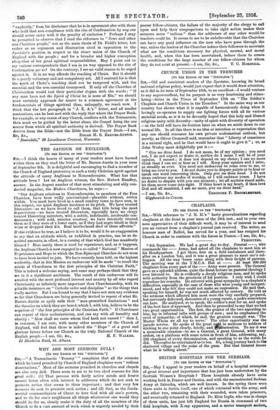THE SAVIOUR ON EXCLUSION. [To TEE Emma or TEE "
SPEcrAroal
SIR,—I think the hearts of many of your readers must have burned within them as they read the letter of Mr. Barnes-Austin in your issue of September 9th. It is delightful and encouraging to find a member of the Church of England protesting in such a truly Christian spirit against the attitude of many Anglicans to Nonconformists. What has that attitude been ? Let an Anglican witness, the Rev. Hubert Handley, answer. In the August number of that most stimulating and ably con- ducted magazine, the Modern Churchman, he says :— " Our Anglican relations to Nonconformists, to members of the Free Churches, have been evilly conventional—plausible without, rotten within. You must have lived in a small country town to have eeen, in this respect, our quiet Anglican insolence at its pitch. We have treated Dissenters—as we have loved to call them, that title being the most depreciatory—we have treated Dissenters, especially have we clergy treated Dissenting ministers, with a subtle, indefinable, intolerable con- descension ; with cold, exterior courtesy, we have interiorly treated them as if they were of a lower caste, as if they had negro blood in their veins or dropped their h's. Real brotherhood died of these affronts."
If this evidence be true, as I believe it to be, would it be an exaggeration to say that an attitude which, as exhibited in practice, can be so de- scribed amounts, in effect, to a cursing of that which God has manifestly blessed ? Here surely there is need for repentance, and, as it happens, the Anglican Church is now engaged in a so-called " National " Mission of Repentance and Hope in which the Non-Episcopal Churches do not seem to have been invited to join. We have recently been told, on the highest authority, that in this Mission an endeavour will be made " to recall the minds of Churchmen to the first principles of the Christian Faith." This is indeed a welcome saying, and some may perhaps think that they see in it a significant antithesis. The result of this endeavour will be awaited with the most profound interest and anxiety by all who regard Christianity as infinitely more important than Churchmanship, with its pitiable insistence on " Catholic order and discipline " as the things that really matter. But I am bound to say that I have not Been any evidence so far that Churchmen are being generally invited to repent of what Mr. Barnes-Austin so aptly calls their " man-prescribed limitations " and the theories on which they are based, which I, with him, believe to be the negation of " the first principles of the Christian Faith." If Churchmen tan repent of their ecclesiasticism, and can say with all humility and charity " How shall we curse whom God hath not cursed ? " then I, in common, I am sure, with many other members of the Church of England, will feel that there is indeed the " Hope " of a great and glorious future before our Church as the truly National Church of the


































 Previous page
Previous page